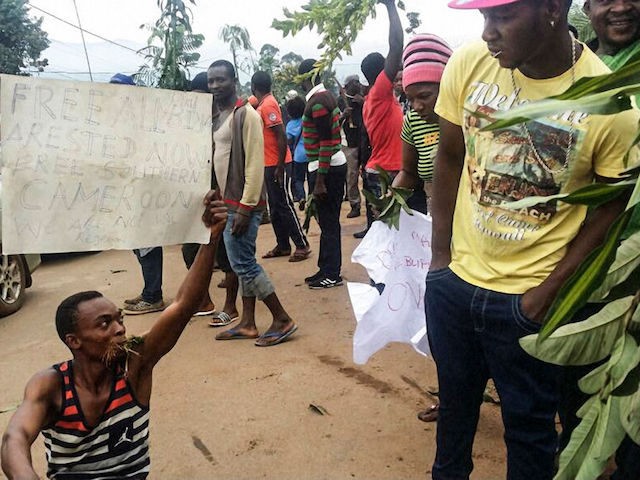This morning’s key headlines from GenerationalDynamics.com
- Cameroon police shoot and kill English-speaking protesters on Sunday
- Catalonia’s leader says the region has ‘won the right to statehood’ from Spain
Cameroon police shoot and kill English-speaking protesters on Sunday

Cameroon police with riot shields in the Anglophone region on Sunday (AFP)
With separatist movements growing in Spain’s Catalonia region and in Iraq’s Kurdistan region, activists in the marginalized Anglophone (English-speaking) regions of Cameroon are demanding independence for Ambazonia, the name that the separatists give to the Southern Cameroons, the home of most of the Anglophone people of Cameroon.
Cameroon’s majority Francophone (French-speaking) government has responded by sending in troops to into the Southern Cameroons to stop the protests with force. Over the weekend, soldiers shot and killed at least seven people and wounded dozens others in several cities in the confrontations.
Unrest began late last year when Anglophone lawyers protested that the legal and court systems are biased toward Francophones, with many laws passed without even being translated into English. Anglophone teachers also went on strike last year, protesting that all courses in the schools had to be taught in French and that any use of English was forbidden.
The police and the army violently dispersed the demonstrators at that time. Several people were severely beaten, dozens of others were arrested and at least two people were shot dead, leading to riots.
On December 8, a pro-government rally was organized in the Anglophone regions, leading to violent clashes with local Anglophones. Four died, several were wounded and around 50 arrested. Demonstrators set fire to a police station, government buildings, and vehicles. The government responded to the demonstrations by placing the region under military control. The violence continued with further incidents in January and February. Now violence is rapidly increasing once more.
The Southern Cameroons was originally a British colony (“British Cameroons”), while the remainder of the country was originally a French colony (“French Cameroun”). In 1961, after a bloody internal war, Cameroon became an independent country, containing both regions, under an agreement under which Anglophones and Francophones would be equal. However, the Francophone majority has failed to keep many promises it made at that time, and they’ve increasingly made the Anglophones a disadvantaged and marginalized minority,
According to a recent report by the International Crisis Group and published two months ago:
If a lasting solution is not found, the next resurgence of the Anglophone problem could be violent. The haughty attitude and cynicism of senior government officials, notably when they say that “as long as the Anglophones do not take up arms, the current strike does not worry [us] unduly”, could promote instability. … “What can the Anglophones do? If they don’t want to go to school, so much the worse for them”, added a senior official. … They are mistakenly relying on the strike losing impetus and the emergence of divisions among strikers, because although the campaign has weakened since May and even if it fizzles out, the fundamental problem will remain and people will continue to feel dissatisfied.
In the two months since the report was published, there has been a resurgence of the problem, and it has been violent.
The description of the “haughty attitude and cynicism of [Francophone] senior government officials” towards the Anglophone people reminds of the attitudes of the French towards the English during the Napoleonic period and during the War of the Spanish Succession. France and England were united against Germany during the two world wars, but over the centuries they never really have gotten along very well. The crisis in Cameroon seems more and more to reflect this ancient difference between the English and French cultures. AFP and BBC and International Crisis Group (2-Aug) and Crux Catholic News
Related Articles
- Cameroon’s army to force English-speaking children to attend school (31-Aug-2017)
- Cameroon: One person killed in English-speaking vs French-speaking civil unrest (23-Nov-2016)
- Cameroon’s president finally caves in, restores internet to English speakers (21-Apr-2017)
- Cameroon shuts down internet for English-speakers protesting French-speakers (15-Feb-2017)
Catalonia’s leader says the region has ‘won the right to statehood’ from Spain
Spain’s national police resorted to substantial violence on Sunday to prevent citizens of Catalonia from casting a vote in the poll for the independence referendum. Police smashed their way into polling stations and used force to remove people from the buildings. Video showed people being kicked and thrown and women pulled by their hair away from the polling stations.
Catalonia’s government is claiming that 90 percent of those who were allowed to vote were in favor of the referendum. Live interviews with Catalan people indicated that some who were opposed to the referendum voted in favor of it anyway, as a protest against the Madrid government’s violent treatment of ordinary people who were simply trying to vote.
In a televised address, Catalonia’s leader Carles Puigdemont said, “With this day of hope and suffering, the citizens of Catalonia have won the right to an independent state in the form a republic.”
Left-wing activists and labor unions are planning a widespread strike on Tuesday. This crisis is far from over. BBC
Related: Catalonia referendum poised to go ahead despite Spain’s harsh repressive measures (01-Oct-2017)
KEYS: Generational Dynamics, Cameroon, Southern Cameroons, Anglophones, Francophones, British Cameroons, French Cameroun, Ambazonia, Liberation Movement of Southern Cameroons Spain, Catalonia, Carles Puigdemont
Permanent web link to this article
Receive daily World View columns by e-mail

COMMENTS
Please let us know if you're having issues with commenting.